
Integrative Organismal Biology
metrics 2024
Connecting Organisms: A Journey Through Biology
Introduction
Integrative Organismal Biology, published by Oxford University Press, is a premier open-access journal dedicated to exploring the intricate relationships and interactions among organisms across various biological disciplines. Since its inception in 2019, the journal has quickly established itself in the academic community, achieving prestigious Q1 rankings in 2023 across key categories including Animal Science and Zoology, Ecology, Evolution, Behavior and Systematics, and Plant Science. With an HIndex that reflects its impactful articles, Integrative Organismal Biology serves as a vital platform for researchers, professionals, and students to disseminate groundbreaking findings and advance the understanding of organismal biology. The journal fosters interdisciplinary collaboration and adheres to rigorous peer-review standards, ensuring high-quality content that is freely accessible to a global audience, thereby enhancing the visibility and impact of research in the thriving field of organismal biology.
Metrics 2024
 -
- 2.20
2.20 2.50
2.50 -
-Metrics History
Rank 2024
IF (Web Of Science)
JCI (Web Of Science)
Quartile History
Similar Journals
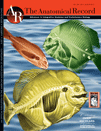
Anatomical Record-Advances in Integrative Anatomy and Evolutionary Biology
Bridging Disciplines for a Deeper Understanding of Life.Anatomical Record-Advances in Integrative Anatomy and Evolutionary Biology, an esteemed journal published by WILEY, serves as a pivotal platform for scholars in the fields of anatomy, biotechnology, ecology, evolutionary biology, and histology. With an ISSN of 1932-8486 and an E-ISSN of 1932-8494, this journal has demonstrated its academic rigor by maintaining a Q2 ranking across multiple relevant categories, including Anatomy and Biotechnology, and consistently achieving a high Scopus ranking in its respective fields. Its scope, covering integrative approaches to anatomical research and evolutionary studies, fosters interdisciplinary collaboration and innovation. Researchers and practitioners can access the journal through various open-access options, ensuring that groundbreaking findings are disseminated widely. As a vital resource for advancing knowledge and exploring emerging trends, this journal greatly contributes to the understanding of biological systems and evolutionary processes, making it an essential read for those dedicated to pushing the boundaries of their respective disciplines.

RUSSIAN JOURNAL OF THERIOLOGY
Bridging Disciplines in Zoology and Plant ScienceRUSSIAN JOURNAL OF THERIOLOGY is a prominent academic journal published by KMK SCIENTIFIC PRESS LTD in collaboration with the esteemed Moscow State University. As a dedicated platform for researchers in the fields of Animal Science and Zoology, Ecology, Evolution, Behavior and Systematics, and Plant Science, this journal strives to advance our understanding of terrestrial ecosystems and their inhabitants. Although it currently holds a Q4 ranking and ranks within the lower percentiles of its respective categories, the journal's consistent publishing output since 2011 showcases a commitment to facilitating scientific discourse and collaboration. Addressed to a diverse audience of researchers, professionals, and students, RUSSIAN JOURNAL OF THERIOLOGY serves as an essential resource for disseminating valuable insights and fostering future advancements in the biological sciences.
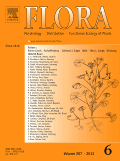
FLORA
Illuminating the Path of Plant Science ResearchFLORA is a distinguished journal published by Elsevier GmbH, focusing on the realms of Ecology, Plant Science, and Evolutionary Biology. Established in 1975, this journal has been a vital platform for researchers and professionals, disseminating groundbreaking findings and insights relevant to the plant sciences. With an impressive impact factor and a current Scopus ranking placing it in the second quartile (Q2) across multiple categories, FLORA is recognized as a critical resource for advancing knowledge in its respective fields. The journal publishes both traditional research articles and significant review papers, ensuring a broad spectrum of academic engagement. Although not open access, FLORA remains committed to enhancing the scientific discourse and fostering collaboration among scholars worldwide. Researchers seeking to enrich their understanding of ecological dynamics and plant biology will find FLORA to be an essential addition to their academic repertoire.
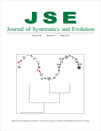
Journal of Systematics and Evolution
Bridging Disciplines in Ecology and Plant ScienceThe Journal of Systematics and Evolution, published by WILEY, is a premier academic journal dedicated to advancing the fields of Ecology, Evolution, Behavior, and Systematics and Plant Science. With a distinguished Q1 ranking in both of these critical categories in 2023, it stands at the forefront of scientific research, placing it in the top quartile among its peers. Featuring both an ISSN of 1674-4918 and an E-ISSN of 1759-6831, the journal has been converging innovative research since its inception in 2008. The journal caters to a global audience of researchers, professionals, and students, providing a platform for disseminating significant findings and fostering academic dialogue. Its impressive Scopus rankings further affirm its impact, coming in at Rank #62/721 in Ecology and Rank #48/516 in Plant Science, highlighting its relevance and influence in these vibrant fields. As an open-access journal, it ensures that groundbreaking research is accessible to all, thus enhancing collaborative opportunities within the scientific community.
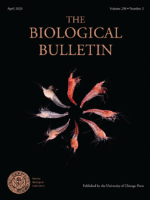
BIOLOGICAL BULLETIN
Advancing knowledge in Agricultural and Biological Sciences.BIOLOGICAL BULLETIN is a premier journal published by The University of Chicago Press, catering to the vibrant field of Agricultural and Biological Sciences. Established in 1945, this long-standing publication has evolved to serve as a critical platform for disseminating cutting-edge research and insights across various biological disciplines. With a commendable impact factor and ranking in the top quartile (Q1) of its category, the journal is recognized for its rigorous peer-review process and its commitment to high-quality scholarship, ranking #74 out of 221 in the Agricultural and Biological Sciences category on Scopus. Researchers, professionals, and students will find a valuable resource in BIOLOGICAL BULLETIN, as it continually fosters scientific dialogue and innovation, ensuring the advancement of knowledge in the biological sciences. Although not openly accessible, the journal provides numerous access options for institutions and individuals wishing to engage with its content.

PALAEONTOLOGIA ELECTRONICA
Unlocking the Secrets of the Past through Open AccessPALAEONTOLOGIA ELECTRONICA is a distinguished open-access journal published by COQUINA PRESS, offering a vital platform for the dissemination of cutting-edge research in the fields of Paleontology and Oceanography. Launched in 1998, this journal has continuously fostered scholarly communication, allowing unrestricted access to scientific findings and contributing significantly to the advancement of the field. With an impressive track record since its inception, PALAEONTOLOGIA ELECTRONICA holds a 2023 Scopus ranking of #39 out of 113 in the Paleontology category, demonstrating its value among academic resources as evidenced by its Q2 quartile ranking. The journal is based in the United States, and it encourages submissions that span a diverse range of topics, from fossil analysis to evolutionary biology. As a prominent resource for researchers, educators, and students alike, it plays a crucial role in shaping the future of paleontological study.

Biology Letters
Bridging disciplines to elevate the field of biological sciences.Biology Letters, published by the esteemed Royal Society, stands at the forefront of research in the field of biological sciences, with a strong emphasis on innovative studies that bridge gaps across disciplines. Since its inception in 2005, the journal has garnered significant recognition, achieving a remarkable Q1 ranking in Agricultural and Biological Sciences (miscellaneous) and a percentile of 88th in the same category, according to Scopus rankings. Released in the United Kingdom, the journal offers a platform for authors to share concise research findings and theoretical perspectives that contribute meaningfully to the advancement of biological inquiry. Although not open access, the journal remains highly regarded in the academic community for its rigorous peer-review process and impactful content, making it an invaluable resource for researchers, professionals, and students dedicated to exploring the complexities of biology. With an ongoing commitment to excellence, Biology Letters continues to shape the future of biological sciences.
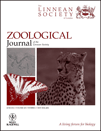
ZOOLOGICAL JOURNAL OF THE LINNEAN SOCIETY
Pioneering insights into the evolution of life.Zoological Journal of the Linnean Society, published by Oxford University Press, stands as a prestigious vessel for scholarly discourse in the fields of Animal Science and Ecology. With an ISSN of 0024-4082 and E-ISSN 1096-3642, this journal has an illustrious history dating back to its inception in 1866, and has consistently contributed groundbreaking research that shapes our understanding of zoology and evolutionary biology. Operating out of the United Kingdom, the journal boasts an impressive Q1 ranking in both Animal Science and Zoology and Ecology, Evolution, Behavior and Systematics, positioning it among the top tier of its category. With a significant presence in the academic landscape, the journal ranks 24th among 490 in Animal Science and 97th among 721 in Ecology, reflecting its impact and relevance in the field. Although it is not an open access journal, the wealth of knowledge it offers is invaluable for researchers, professionals, and students alike, aiding in the advancement of zoological sciences.

Fishes is a premier academic journal dedicated to the exploration and dissemination of cutting-edge research in the fields of aquatic science and ecology. Published by MDPI in Switzerland, this open-access journal has been accessible to researchers globally since its inception in 2016, allowing for the rapid exchange of knowledge that fosters scientific advancement in the study of fish and aquatic ecosystems. With its convergence in the years 2016 to 2024, Fishes proudly holds a notable position in the academic community, evidenced by its category quartile rankings of Q3 in Aquatic Science and Q2 in Ecology for 2023. The journal consistently features innovative research encompassing ecological interactions, conservation strategies, and evolutionary studies within aquatic environments. By integrating interdisciplinary approaches and encouraging contributions from a diverse array of experts, Fishes serves as an invaluable resource for researchers, professionals, and students alike, contributing to the understanding and preservation of our precious aquatic biodiversity.
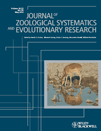
JOURNAL OF ZOOLOGICAL SYSTEMATICS AND EVOLUTIONARY RESEARCH
Connecting the Dots of Animal Science and EvolutionThe Journal of Zoological Systematics and Evolutionary Research, published by Wiley-Hindawi, stands as a premier academic journal since its establishment, showcasing cutting-edge research in the fields of Animal Science, Zoology, and Ecology. With an impressive track record spanning from 1963 to the present, this journal has earned a Q1 classification in both Animal Science and Ecology, as well as recognized rankings in Genetics and Molecular Biology. Its impact is highlighted by its Scopus ranks, placing it in the top percentile for relevant categories, underscoring its vital role in advancing knowledge and understanding within these disciplines. Researchers, professionals, and students will find a wealth of high-quality, peer-reviewed articles that contribute to the evolutionary understanding of biodiversity and systematics. Though not an Open Access journal, it remains accessible to a wide audience committed to exploring the intricacies of zoology and evolutionary biology.